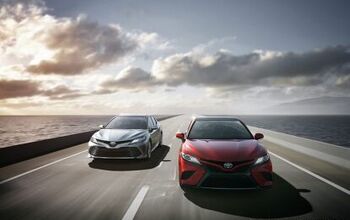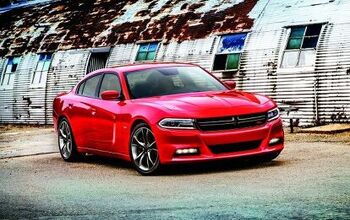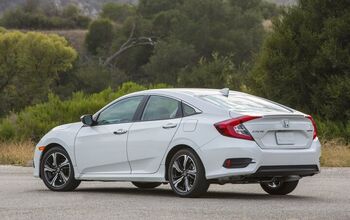Ask Jack: Not That Kind of SS

Last week, we discussed the fact that the gap between automotive perception and automotive reality can lead to some remarkable cognitive dissonance on the part of “car people.” That’s why the breadvan Civic Si was sold as a budget-priced Bimmer-beater and the breadvan Scion xB was sold as a Portland-friendly mobile Millennial drum circle. They knew very few Civic “intenders” would look at a Scion and vice versa.
This sort of stuff runs rampant in the business and, if you want any further confirmation of it, just take a look at the staggeringly different demographic profiles for the mechanically similar Cadillac Escalade, GMC Yukon Denali, and Chevrolet Tahoe Premier.
But wait, there’s more. Thanks to a wide variety of advances in materials, design methods, and computing power, the capability envelope of modern vehicles is expanding in all directions. My 2017 Silverado 6.2-liter just got an average of 22.1 mpg on a 680-mile drive from Ohio to South Carolina; my 2006 Phaeton got 17 mpg flat on the same trip despite being a thousand pounds lighter, 100 horsepower weaker, and considerably more aero-friendly. Next week, you’re going to hear a lot about how the Audi TT-RS is faster than (insert name of supercar here) from 0-60. Much of that will be regurgitated pablum from a staggeringly expensive press trip that includes a private helicopter ride from Manhattan to Lime Rock, and some of it is due to advances in tire tech, but there’s some real truth to the fact that the mighty Ferrari Enzo can be humbled in a short sprint by a car that is basically a VW Jetta in a party dress.
As cars become more capable, they are also going to engage in hitherto-unseen marketplace conflicts. Should you buy a 7 Series Bimmer or a Denali XL? A Corvette or a Macan Turbo S? Which brings us to today’s unusual matchup… but before we click that jump, here’s a reminder to send your most burning questions to askjack@calamarco.com.
Westin writes:
I’m looking at purchasing either a 2005 997 911 (non-S) with 85k miles and no history of a clutch replacement or IMS bearing fix, or a 2015 Chevrolet SS. I know that these vehicles two couldn’t be further from each other.
2005 911: I used to have a 1995 NSX and I like the idea of having a coupe with the engine behind me again. I test drove a non-S 997 and wasn’t blown away or anything, but could definitely see myself growing to love the car. I’m leasing a cheap daily so practicality isn’t a concern. I worry about the mileage, maintenance horror stories, and the depreciation. I am legitimately afraid of taking it to the track and having the engine decide it’s time for a $10k visit to the Porsche dealership. I would definitely join PCA as soon as I got the car and am excited at the prospect of all the track days the club puts on, but not at the risk of staring down a costly repair bill.
2015 SS: So… I may have convinced my former girlfriend to buy an SS with a stick. Of all the things I miss about that relationship, that car is up there. This is to say that I drove her car as often as I could get away with and thoroughly enjoyed it every single time. I truly think it’s the last of the big, V8, manual, American sedans. It’s not as fast as the 911 and doesn’t have that Porsche appeal, but I could see it holding its value and it would replace my lease as my only car. My worries about maintenance are much lower as A) the example I’m looking at has 17k miles, and B) it has a damn LS3. I would also track this car and have far less worries about it breaking.
Am I crazy for choosing between these two?
Short answer: of course not. You’re being smart. The automotive landscape has changed. There was no overlap in 1972 between, say, a 911E and the Impala that didn’t quite make it. The same would be true for, say, an ’84 Carrera 3.2 and a Celebrity Eurosport. That was then and this is now.
There’s not much overlap in packaging between the 997-era Porsche Carrera and the current Chevrolet SS, but there is an overlap in performance. I’d be willing to bet that the two cars would be remarkably close in everything from an impromptu street quarter-mile to a couple of laps around Mid-Ohio. The former being much more important than the latter, of course, because in the real world most of us measure performance by how well we can get around some freeway traffic, across a couple of lanes, and through a tight 25-mph exit. An SS and a 911 will perform that particular task with approximately the same aplomb.
Here are some short thoughts of mine regarding the pros and cons:
* The 911 will be much cheaper to track… right up to the moment the engine blows. You’d be surprised just how easy a watercooled modern Porsche is on tires and brakes. No reason you couldn’t get five weekends out of a set of Hoosier R7s, although they’ll be relatively slow near the end. A set of Pagid Orange brake pads can last you the whole trackday season. An SS, on the other hand, will chew through consumables like Pookie hittin’ that rock. With that said, the LS3 isn’t gonna go pop and, if it does, it’s a $3k fix.
* On the other hand, maintenance costs are in no way equal. You should expect to spend two or three grand a year on your 911 just keeping it serviced and repaired. This is a real cost that many Porsche owners forget when they are enthusiastically calculating their maximum monthly payments. Not that the SS will be cheap. Those cars have expensive and bespoke components in them that have to be overnighted from Australia, yo. Ask my little brother about G8 repair costs and that will give you an idea.
* The 911 will depreciate more slowly. Or will it? A 20-year-old base 911 is a $15,000 car. So is a decade-old GTO. But something tells me the SS will be worth real money to the right people down the line.
* The Porsche is a better everyday car than people believe. The SS is a worse everyday car than people believe. After my divorce, I used my Boxster as a daily driver for about half a year. Never had any issue. The SS, on the other hand, is a big, hard-to-park car with fragile wheels.
I really think you could make the case either way… however, when I read your email I detect a lot more enthusiasm for the SS than for the Panzerwagen from Porsche. That makes this a no-brainer. Buy the Chevy and don’t look back. It’s one thing to buy a truck or a van with the idea that you could “come to love it” — but a fussy Super Beetle chock-full of solid-gold parts with an appetite for seals? Hell no. It’s SS time.
[Image: General Motors]

More by Jack Baruth
Latest Car Reviews
Read moreLatest Product Reviews
Read moreRecent Comments
- Slavuta Autonomous cars can be used by terrorists.
- W Conrad I'm not afraid of them, but they aren't needed for everyone or everywhere. Long haul and highway driving sure, but in the city, nope.
- Jalop1991 In a manner similar to PHEV being the correct answer, I declare RPVs to be the correct answer here.We're doing it with certain aircraft; why not with cars on the ground, using hardware and tools like Telsa's "FSD" or GM's "SuperCruise" as the base?Take the local Uber driver out of the car, and put him in a professional centralized environment from where he drives me around. The system and the individual car can have awareness as well as gates, but he's responsible for the driving.Put the tech into my car, and let me buy it as needed. I need someone else to drive me home; hit the button and voila, I've hired a driver for the moment. I don't want to drive 11 hours to my vacation spot; hire the remote pilot for that. When I get there, I have my car and he's still at his normal location, piloting cars for other people.The system would allow for driver rest period, like what's required for truckers, so I might end up with multiple people driving me to the coast. I don't care. And they don't have to be physically with me, therefore they can be way cheaper.Charge taxi-type per-mile rates. For long drives, offer per-trip rates. Offer subscriptions, including miles/hours. Whatever.(And for grins, dress the remote pilots all as Johnnie.)Start this out with big rigs. Take the trucker away from the long haul driving, and let him be there for emergencies and the short haul parts of the trip.And in a manner similar to PHEVs being discredited, I fully expect to be razzed for this brilliant idea (not unlike how Alan Kay wasn't recognized until many many years later for his Dynabook vision).
- B-BodyBuick84 Not afraid of AV's as I highly doubt they will ever be %100 viable for our roads. Stop-and-go downtown city or rush hour highway traffic? I can see that, but otherwise there's simply too many variables. Bad weather conditions, faded road lines or markings, reflective surfaces with glare, etc. There's also the issue of cultural norms. About a decade ago there was actually an online test called 'The Morality Machine' one could do online where you were in control of an AV and choose what action to take when a crash was inevitable. I think something like 2.5 million people across the world participated? For example, do you hit and most likely kill the elderly couple strolling across the crosswalk or crash the vehicle into a cement barrier and almost certainly cause the death of the vehicle occupants? What if it's a parent and child? In N. America 98% of people choose to hit the elderly couple and save themselves while in Asia, the exact opposite happened where 98% choose to hit the parent and child. Why? Cultural differences. Asia puts a lot of emphasis on respecting their elderly while N. America has a culture of 'save/ protect the children'. Are these AV's going to respect that culture? Is a VW Jetta or Buick Envision AV going to have different programming depending on whether it's sold in Canada or Taiwan? how's that going to effect legislation and legal battles when a crash inevitibly does happen? These are the true barriers to mass AV adoption, and in the 10 years since that test came out, there has been zero answers or progress on this matter. So no, I'm not afraid of AV's simply because with the exception of a few specific situations, most avenues are going to prove to be a dead-end for automakers.
- Mike Bradley Autonomous cars were developed in Silicon Valley. For new products there, the standard business plan is to put a barely-functioning product on the market right away and wait for the early-adopter customers to find the flaws. That's exactly what's happened. Detroit's plan is pretty much the opposite, but Detroit isn't developing this product. That's why dealers, for instance, haven't been trained in the cars.


































Comments
Join the conversation
The choices are not good. In one corner we have a 13 year old not fast time bomb waiting to bankrupt you, but it is Porscheeeee so good to impress impressionable mid-westerners like Jack. Or Here is a unicorn chevy cobalt looking thing with a V8 from several generations ago Corvette that no Chevy dealer sees often enough to know how to fix and parts are hard to come by. Again midwestern impressionable men like Jack think ahhh a car with corvette engine, but trust me it's no Corvette. A wise man would recommend a 2015-2016 Ford Mustang GT to the young man. Obviously perception and price matter to him as some measure of performance. You get more street cred with a Mustang GT and with perf package GTs (choose gear ratios and wheels/tires carefully) a manual Mustang GT all day every day.
This is Westins dad and I am a car guy too. I just tend to be (at 57) more of the space, grace and pace temperament. I want fast, roomy, quiet, good handling car, those are my priorities. That said, the SS is the perfect car for Westin. A sleeper that is fun. His face lights up every time he is behind the wheel of that thing. He may need to get a Prius as a daily for Austin though but the SS rocks! I love the 911 but that can wait for his career to advance a little more, the SS is perfect for this time, this place.